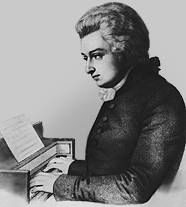1. See Discussion Questions for Use With any Film that is a Work of Fiction.
2. What should Salieri have done when faced with Mozart’s genius?
Suggested Response:
Salieri should have continued to explore and develop his own talent while, at the same time, appreciating Mozart’s genius. Salieri could not tell what future generations would think of his music. But even if Salieri knew that he couldn’t aspire to equal Mozart, he should have accepted this fact and appreciated Mozart’s genius.
The next three questions should be prefaced with the following:
Salieri was a very religious man. He called Mozart’s music the “very voice of God.” But then he burned his crucifix and said to God, “From now on we are enemies, you and I. Because you choose for your instrument a boastful, lustful, smutty, infantile boy and give me for reward only the ability to recognize the incarnation. Because you are unjust [and] unkind, I will block you. I swear it. I will hinder and harm your creature on earth. As far as I am able, I will ruin your incarnation.”
3. Compare Salieri to Job from the Bible. How were they alike and how were they different?
Suggested Response:
See suggested response to the Quick Discussion Question in Parenting Points.
4. Compare Salieri to Professor Lambeau in Good Will Hunting. How were they alike and how were they different.
Suggested Response:
They both recognized genius in a young man that allowed him to effortlessly surpass all of their achievements despite all their training and hard work. Professor Lambeau sought to nurture and develop Will’s talent for Will’s benefit, for the benefit of the study of mathematics, and perhaps for Lambeau’s own personal benefit. It may not have been the right time for Will to focus on math and work and Lambeau obviously missed this point. However, he was nurturing. Salieri, on the other hand, wanted to kill Mozart and claimed that God had done Salieri a great injustice by creating a Mozart and giving Salieri enough talent and understanding to recognize what a genius Mozart was.
5. How does the figure of Salieri relate to the devil in Milton’s Paradise Lost?
Suggested Response:
Salieri suffers from pride, which was a sin of the devil in Paradise Lost. His pride will not permit him to acquiesce to God’s decision to give genius to Mozart and not to him.
6. Why do so many people believe that music is the voice of God?
Suggested Response:
There is no one correct answer to this question. A strong answer will mention: (1) the strong feelings that music evokes; (2) its timeless quality; (3) its capacity to remove one from the cares of daily life; (4) its universal quality (most everyone can understand the emotions evoked by music).
7. Would you say that this statement was Salieri’s conversion to the “dark side” of “the Force” described in the Star Wars movies?
Suggested Response:
If Salieri tries to interfere with the creation of something beautiful, he has gone over “the dark side.”
8. What did the Emperor mean when he said that his court should make some effort to “acquire” Mozart?
Suggested Response:
In the seventeenth-century artists worked for rulers and were thought of as an adornment to their courts. The various rulers competed to see who could attract the best artists. It was a matter of prestige.
9. Did you admire the Emperor for trying to learn music or did you object to the fact that someone of so little talent had power over people of much greater talent? Or did you have both feelings?
10. In the movie “Amadeus,” what was the use to which the screenwriter put the Emperor’s musical aspirations? How did it relate to the themes of the play?
Suggested Response:
The Emperor’s musical aspirations were comical relief but they also related to the themes of the play in that compared to Mozart’s genius, Salieri was like the Emperor was to a talented professional musician, i.e., not very good at music.
11. What was the meaning of the Emperor’s yawn during the performance of Mozart’s opera?
Suggested Response:
It meant that the production didn’t excite him. The practical effect was a very bad review and since the Emperor was very powerful, it meant that others would copy his evaluation, even it they disagreed.
12. The Emperor criticized Mozart’s opera as having “too many notes.” Why did Salieri agree with this absurd statement?
Suggested Response:
He was trying to flatter the Emperor.
13. If Mozart were alive today, would he compose the same music that he wrote in the 18th century, some 250 years ago? Explain your answer.
Suggested Response:
Mozart would not compose the same music as what he wrote when he was alive. The music he wrote in 18th-Century Europe was successful because that is what people wanted to hear at that time and place. Today, he would probably be inspired by the music of the past and present and from that, he would create something entirely new. Mozart was essentially a pop star of his time; if he were alive today, he would be known for starting new trends, not following old ones.
14. Think of all the musical artists you have listened to. Which contemporary artist (e.g. singer, band, rock/pop star, etc.) do you think will have a lasting presence in musical history? Why?
Suggested Response:
Responses will vary. Answers should include a musical artist (roughly from 20th Century to the present, such as the Beatles, Lady Gaga, Tupac, etc.) and why their music will still be heard and played in the future (i.e. because their music is interesting, is meaningful, has inspired other artists, etc.).





